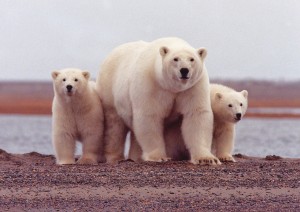We have much more to do and your continued support is needed now more than ever.
What Shrinking Ice Means for Polar Bear Cubs
Right now in the dead of winter, polar bear moms in the Arctic are searching for food to make up for the calories that were lost during the fall—when record low ice meant that the start of their winter hunting season was delayed.
Polar Bears’ Hunting Season is Getting Shorter

Last year, after ice hit a record low, the fall freeze up was delayed. The lack of near-shore ice over the shallow waters where most seals live left the polar bears with a much foreshortened period to hunt for seals in areas where the seals are abundant.
Right now in the dead of winter, the polar bears are struggling to make up for the calories they were unable to gain in the fall.
Struggle Increasing to Feed Cubs
Finding food to eat is not just about meeting adult polar bears’ hunger—it’s also about making sure that the cubs at their side will survive. Adult female polar bears must find enough food to build up the reserves they need to become pregnant and successfully give birth and nurse tiny cubs in their secure winter den.
Pregnant polar bears are the only ones who enter dens in the fall; other polar bears, including females that have cubs, will hunt all winter. Pregnant females will give birth to a litter of usually two tiny cubs in their highly insulated den. After 5-6 months in their den, the family will emerge from their dens and begin their hunt for the food they need to assure her cubs will survive.
After they leave their dens, the polar bear moms must find enough seals to replenish her depleted reserves and give her cubs a shot at surviving for the next 2 years, until the cubs are able to fend for themselves.
Climate Change Harming Cubs’ Survival
Climate change is dramatically reducing the amount of time available for mother polar bears to hunt enough seals to give her cubs a chance of surviving.
The ice is increasingly far off shore and over deeper waters which are less productive for their prey of seals. And climate change is causing arctic ice over the shallow near-shore waters where seals are most abundant to both break up earlier in the spring and to form up later in the fall.
This leaves all polar bears less and less time to find food, but the squeeze is particularly hard on recent mothers because of the high energy demands associated with giving birth to and raising their cubs. Polar bear moms nurse their cubs for over two years until the cubs are big enough to survive on their own.
When polar bears can’t find as much food in the spring and fall as they need, cubs just aren’t born or do not survive.
Fight for the Next Generation of Polar Bears
For polar bear moms to win their struggle against hunger, they need us to curb the unprecedented warming in the Arctic. Alaska has warmed twice as much as the contiguous United States, and warming is severely altering the Arctic landscape, including melting permafrost.
In 2012, over 3 million people like you spoke up in support of limits to carbon pollution from new coal-fired power plants. Across the U.S., three times as many voters say the government is doing too little to protect America’s air, water, wildlife and other natural resources (44 percent) as say it’s doing too much (14 percent), according to a post-election Zogby poll. And two-thirds of voters (65 percent) say elected officials should take steps now to reduce the impact of climate change on future generations, while just 27 percent say we should wait for more evidence.
The President is listening, but time is short. We need to remind President Obama that his legacy depends on taking action on climate change by taking immediate steps to halt the expansion of dirty energy, like tar sands, and set limits on carbon pollution from coal-burning power plants—the largest source of carbon pollution in the nation.
Let’s take advantage of this opportunity.
![]() Speak up for the polar bears cubs—urge the President to move forward on addressing climate change now.
Speak up for the polar bears cubs—urge the President to move forward on addressing climate change now.





















